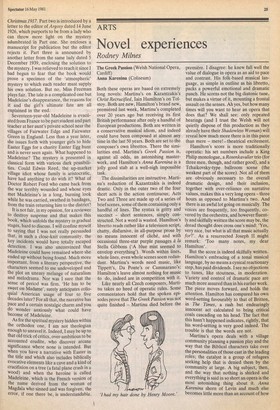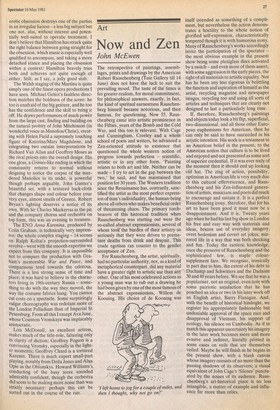ARTS
Novel experiences
Rodney Mdnes
The Greek Passion (Welsh National Opera, Cardiff) Anna Karenina (Coliseum) Both these operas are based on extremely long novels: Martinu's on Kazantzakis's Christ Reerucified kin Hamilton's on Tolstoy. Both are new, Hamilton's brand new, premiered last week, Martinu's completed over 20 years ago but receiving its first British performance after only a handful of European productions. Both are written in a conservative musical idiom, and indeed could have been composed at almost any time in the last 50 years. Both are set to the composer's own librettos. There the similarities end. Martinu's Greek Passion is, against all odds, an astonishing masterwork, and Hamilton's Anna Karenina is a jolly good stab at a well-nigh impossible task.
The dissimilarities are instructive. Martinu's reduction of Kazantzakis is indeed drastic. Only in the outer two of the four short acts is the action continuous; Acts Two and Three are made up of a series of brief scenes, some of them containing only a handful of lines. The syntax is gritty and succinct — short sentences, simply constructed. Not a word is wasted. Hamilton's libretto reads rather like a television script, chatty, distursive, in all-purpose prose by no means innocent of cliche, and with occasional three-star purple passages d la Stella Gibbons CA blue mist seemed to envelop everything). Words within lines, whole lines, even whole scenes seem redundant. Martinu's words need music, like Tippett's, Da Ponte's or Cammarano's; Hamilton's leave almost nothing for music to do, indeed are in competition with it. Like nearly all Czech composers, Martinu takes no heed of operatic rules. Some commentators hold that the spoken episodes prove that The Greek Passion was not quite finished — Martinu died before the premiere. I disagree: he knew full well the value of dialogue in opera as an aid to pace and contrast. His folk-based musical language, as simple in outline as his libretto, packs a powerful emotional and dramatic punch. He scorns not the big diatonic tune, but makes a virtue of it, mounting a frontal assault on the senses. Ah yes, but how many times will you want to hear an opera that does that? We shall see: only repeated hearings (and I trust the Welsh will not quietly dispose of this production as they already have their Shadowless Woman) will reveal how much more there is in this piece than mere — mere!—theatrical excitement.
Hamilton's score is more traditionally operatic: his set numbers include a King Philip monologue, a Rosenkavalier trio (for three men, though, and rather good), and a Tchaikovsky-type ballroom scene (the weakest part of the score). Not all of them are obviously necessary to the overall dramatic design, and their inclusion, together with over-reliance on narrative values, makes this a very long opera — three hours as opposed to Martinu's two. And there is an awful lot going on musically. The voices are frequently, too frequently, covered by the orchestra, and however fluently and skilfully written the score may be, the dread thought does cross one's mind: 'Yes, very nice, but what is all that music actually for?'. As a resurrected Joseph II might remark: 'Too many notes, my dear Hamilton'.
But the score is indeed skilfully written. Hamilton's embracing of a tonal musical language, by no means a cynical reactionary step, has paid dividends. I see no objections to tunes, like stoutness, in moderation. Variety and control of dramatic pace are much more assured than in his earlier work. The piece moves forward, and holds the attention. Hamilton has compared his own word-setting favourably to that of Britten, in The Times, a rash but endearingly innocent act calculated to bring critical coals cascading on his head. The fact that this hasn't happened indicates, rightly, that his word-setting is very good indeed. The trouble is that the words are not.
Martinu's opera deals with a village community planning a passion play and the way that the Biblical characters take over the personalities of those cast in the leading roles; the catalyst is a group of refugees seeking help that is denied them by the community at large. A big subject, then, and the way that nothing is shirked and everything is said in so short an opera is the most astonishing thing about it. Anna Karenina shorn of Levin and much else becomes little more than an account of how erotic obsession destroys one of the parties in an irregular liaison a less big subject but one not, alas, without interest and potentially well-suited to operatic treatment. I don't believe that Hamilton has struck quite the right balance between going straight for the obsession, which music is especially well qualified to encompass, and taking a more detached stance and placing the obsession within a context: Hamilton bravely tries both and achieves not quite enough of either. Still, as I say, a jolly good stab.
The Welsh staging of the Martinu is quite simply one of the finest opera productions I have seen. Michael Geliot's faultless direction matches the boldness of the score: he too is unafraid of the big gesture, and he too has the confidence and the skill to bring it off. He draws performances of much power from the large cast, finding and building on the natural probity of John Mitchinson (in wonderful voice as Manolios/Christ), creating with Helen Field a supremely touching figure of Katerina/Mary Magdalene, and integrating two outsize interpretations by Richard Van Allan and Geoffrey Moses as the rival priests into the overall design. His one gloss, a Grimes-like ending in which the community returns to normal without deigning to notice the corpse of the murdered Manolios in its midst, is powerful though perhaps arguable. John Gunter's beautiful set, with a textured back-cloth that changes shape and colour before your very eyes, almost smells of Greece. Robert Bryan's lighting deserves a notice of its own. With Sir Charles Mackerras in the pit and the company chorus and orchestra on top form, this was an evening to treasure.
The ENO Anna Karenina, produced by Colin Graham, is technically very impressive: the whole complex staging — 14 scenes on Ralph Koltai's projection-surrounded revolve went with the smooth expertise we expect from this company. It is impossible not to compare the production with Graham's memorable War and Peace, and comparisons tend towards the odorous. There is a less strong sense of time and place; it was hard to believe in the characters living in 19th-century Russia — something to do with the way they moved, the way the costume fabrics hung. You cannot cut costs on a spectacle. Some surprisingly vulgar choreography was redolant more of the London Palladium than of Imperial St Petersburg. From all this! except Ava June, whose Countess Vronskaya was implacably aristocratic.
Lois McDonall, an excellent actress, makes much of the title-role, faltering only In clarity of diction; Geoffrey Fogson is a convincing Vronsky, especially in the lighter moments; Geoffrey Chard is a tortured Karenin. There is much expert small-part playing, notably from Della Jones and Alan Opie as the Oblonskys. Howard Williams's conducting of the busy score sounded admirably confident, though the orchestra did seem to be making more noise than was strictly necessary: perhaps this can be sorted out in the course of the run.











































 Previous page
Previous page